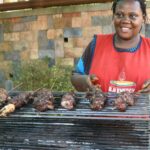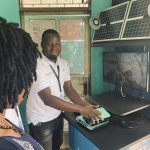Background
The Higher tier Cooking Component (HTCC) project is a component of the Strengthening the Entrepreneurial Ecosystem for the Clean Cooking Sector (SEE-CC) financed by the European Commission, the Netherlands Ministry of Foreign Affairs, and the Ministry of Foreign Affairs of Denmark. The HTCC project is coordinated by the Netherlands Enterprise Agency (RVO) and implemented by GIZ Energising Development (EnDev) to strengthen the supply side by supporting small and medium-sized enterprises in improving their business operations and access to finance as well as promote upscaling and innovations in the cooking sector across four countries in Asia and sub-Saharan Africa including Uganda, Bangladesh, Ethiopia, and Cambodia. The project is designed to support three strategic pillars. These include; Pipeline Development through Business Development Support (BDS) that is coordinated by Energy Enterprise Coach (EEC) , Access to Finance through the Results Based Finance Facility (RFB) & the Innovation Challenge Fund (ICF) as well as Enabling Environment in collaboration with the Ministry of Energy and Mineral Development (MEMD). Across the three implementation pillars is the component of gender mainstreaming which is being supported by Energia.
Through a holistic technology approach including both e-cooking and advanced biomass cook stoves, HTCC Uganda aims to reach 12,000 households or 60,000 beneficiaries with higher tier cooking technologies (6,000 e-cooking and 6,000 Advanced Biomass Cookstoves).
The Innovation Challenge Fund
Access to clean cooking technologies is crucial for improving health outcomes, reducing environmental degradation, and enhancing energy efficiency in Uganda. However, access and adoption of higher tier clean cooking technologies remains limited, largely because of the existence of few market players. The technological diversity and sales volumes are also very low and greatly hindered by import duties and related supply chain challenges which subsequently contributes to high product costs. The higher tier market segment in Uganda is poorly developed, with only a handful of product distributors in the market and very few product manufacturers. The market for electric cooking for example, is only limited to standalone appliances, such as water boilers and Electric Pressure Cookers (EPC) mostly imported from China, which are sold predominantly in supermarkets or online (e.g., on Jumia). A few private sector companies are in the early phase of piloting or research and design stages in developing e-cooking devices that are adapted to the Ugandan context.
To address the above challenges, HTCC Uganda has designed an Innovation Challenge Fund that is geared towards establishing a competitive business environment to promote and increase the adoption of Higher Tier Clean Cooking solutions.
Objectives
The Innovation Challenge Fund aims to:
- Stimulate the development and deployment of innovative higher tier clean cooking technologies and/or business models in Uganda.
- Promote partnerships and collaborations between global technology developers/manufacturers, and local product distributors to foster the strengthening of the value chain for clean cooking solutions in-country.
- Catalyse market-driven solutions that address the barriers for adoption and scale-up of higher tier clean cooking technologies.
- Address the gender-specific barriers, mitigate inequalities towards persons with special needs and create opportunities within the clean cooking sector, ensuring that youth, women, and men have equal access to benefits, resources, and decision-making processes.
Support Pillars and Technology Focus
Support Pillars
The application and support will be geared towards innovations that are focused on three thematic pillars. The final selection will depend on the quality and viability of the proposed solutions/projects that suit the objectives of the ICF. Applicants are encouraged to apply for only one of the listed support pillars. However, considerations may be given to those with more than one cross cutting theme if it is clearly documented in the application.
- Research and Development (R & D)
- Market Development and Innovative Business Models
- Digitalization and Knowledge Management
Technology Focus
HTCC Uganda is keen to scale-up existing and foster new higher tier cooking solutions manufacturers and distributors through a tailored approach of funding cross-cutting innovative solutions to ensure growth of both the supply and the demand for clean cooking solutions in Uganda. The Innovation Challenge Fund will support innovations related to the following cooking solutions:
- Advanced Biomass Stoves: Applicants are encouraged to develop/promote efficient, affordable, and user-friendly modern biomass stoves that minimize fuel consumption, reduce emissions, and improve cooking efficiency. Focus will be given to technologies considered to be under the Tier 3 and above Multi-Tier Framework (MFT) based on ISO 19867-1:2018 or UNBS Class 2 under the US 761:2019 performance standards.
- Energy Efficient Electric Cooking Appliances: Encourage the development/promotion/sale of energy-efficient electric cooking appliances that utilize renewable energy sources, such as solar or grid-connected electricity, to promote clean cooking practices. These could include appliances such as EPCs, Induction Stoves and Rice Cookers that meet the Global LEAP Test Protocols/VeraSol Test protocol.
Eligibility
Who Can Apply
Applications are open to all Small and Medium Enterprises (SMEs)/ companies, or organizations operating in the clean cooking sector in Uganda. Companies seeking to explore innovations or need support in upscaling their access and outreach for clean cooking technologies and services are encouraged to apply.
Eligibility Criteria
Eligible applicants will be expected to meet the following conditions to qualify for the ICF project.
Legal Status
- Be legally registered and recognised in Uganda as manufacturer, distributor, and or Clean Cooking Enterprises that sells/distributes own- or third-party higher tier cookstove technologies or services.
- Be accredited by a research/academic institution. Academic and research institutions are prohibited from applying but can play a supportive role to private sector players.
- Be legally registered and recognised in Uganda as a NGO and be in the possession of a certificate of incorporation/registration certificate, valid trading license/operating license, and a tax registration certificate.
- Consortiums of 2-4 maximum are welcome to apply. The proposal must clearly outline the role of each entity in the consortium and specify the Lead Agent who will be responsible for all coordinating the consortium members and reporting on all contractual obligations to GIZ.
Financial Status.
- Be in possession of audited financial company or bank statements for the last one year that are certified by a third-party and/or accredited audit firm/certified accountant.
- Be able to submit a detailed budget for your project.
Gender Mainstreaming
- Applicants are encouraged to show evidence of gender mainstreaming across their implementation strategy as it serves as an added advantage in the selection processes.
Evaluation Criteria
Eligible applicants will be assessed against the following selection criteria.
- Motivation Statement from Applicant: (15%)
- Proposed project strategy/approach/business model regarding ICF support window (20%)
- Years of Operation: 10%
- Licensing status: 10%
- Organizational Structure: 10%
- Financial Information: 10%
- Female participation in management and operations: 15%
- Previous participation/ experience in implementing an ICF or similar projects (5%)
- Other considerations (Certification of products) 5%
Shortlisted applicants will be individually contacted to submit a full proposal and budget using a different template that will be provided.
Other Considerations for Evaluations
- Due Diligence Checks: A detailed due diligence will be conducted by an independent audit consultant as part of the evaluation process during which legal, financial, and commercial compliance aspects of the applicant will be assessed. This may involve site visits, interviews with management, staff, and review of a company’s financial and legal documentation where necessary. Shortlisted applicants will be required to participate in this process and provide the relevant information/documentation to the audit consultant to facilitate this due diligence process.
- Pitch Sessions: The shortlisted participants will be invited for a pitch session to the GIZ –HTCC Uganda team who will evaluate the project proposals as well as presentations based on predefined criteria, including technical feasibility, innovation potential, scalability, and sustainability.
Funding and Support
Successful proposals will receive between EUR 20,000 to EUR 50,000 to implement their innovative, sustainable solutions. The funding request in the proposal should be realistic and reasonable and GIZ reserves the right to allocate less funds than requested. Those who are not successful in this application window may be referred to Energy Enterprise Coach (EEC) for Business Development Support as part of preparing them for future funding opportunities.
How to Apply
To apply download, fill and submit a fully filled expression of Interest document which can be accessed HERE.
A completely filled Expression of Interest (EOI) Application form and other relevant documents/ annexes to should then be submitted to ella.tirwomwe@giz.de and copy in solomon.atepo@giz.de
The Subject line MUST read: “HTCC Uganda ICF Application: [Insert Company Name] [Insert name of ICF Application Pillar], [Insert Submission Date]”. (Deviation from this instruction my lead to your application being rejected.)
Application Period:
The Call for applications is open from 30th November 2023 to 26th January 2024 at 5pm EAT.
During this application window, applicants are also free to send their request for clarification to ella.tirwomwe@giz.de cc solomon.atepo@giz.de not later than 15th January 2024. The email subject line clarifications should read: Request for clarifications ICF_HTCC Uganda Applications
Project Implementation:
The recipients of the innovation window will be expected to implement their innovations for a period until maximum 31st December 2024 from the time when they sign a contract with GIZ-EnDev Uganda.
Further inquiries
For any additional inquiries please review the FAQ that has been saved HERE.


